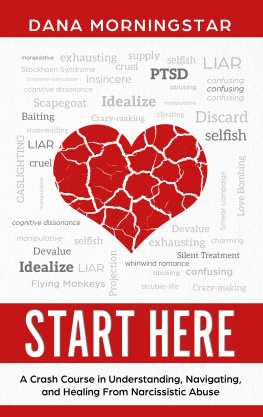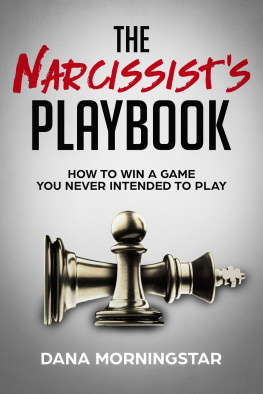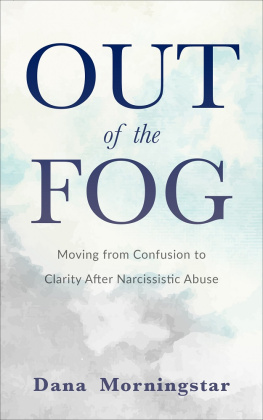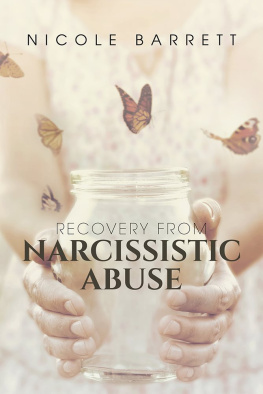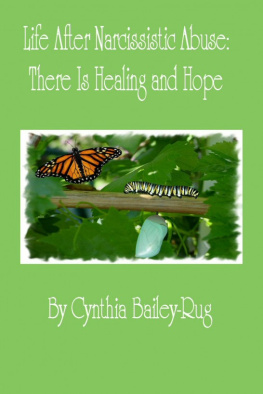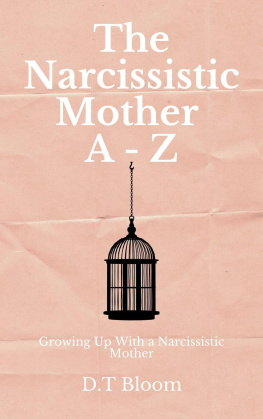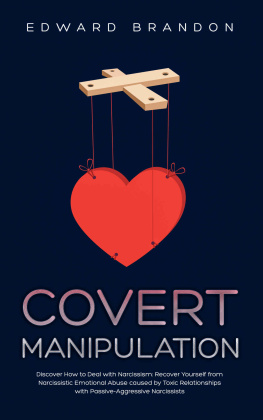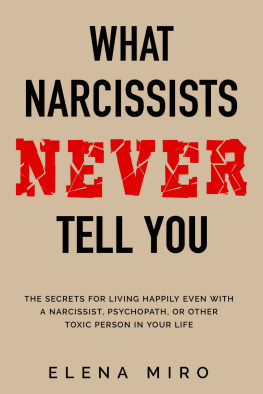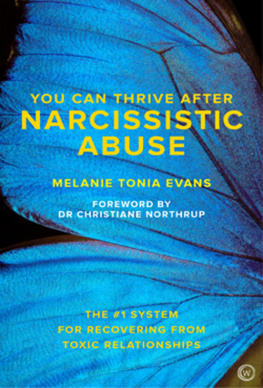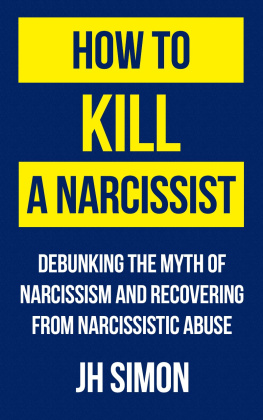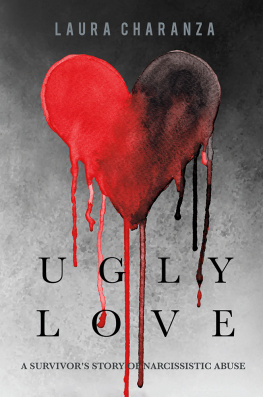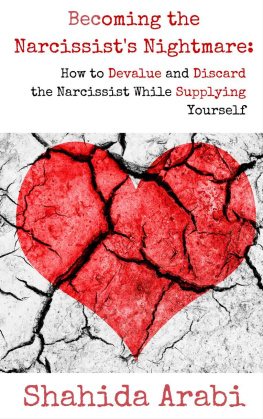Start Here:
A Crash Course in Understanding, Navigating, and Healing from Narcissistic Abuse
Dana Morningstar
Copyright 2017 by Dana Morningstar
All rights reserved. This book or any portion thereof
may not be reproduced or used in any manner whatsoever without the express written permission of the publisher except for the use of brief quotations in a book review.
Printed in the United States of America
First Printing, 2017
Morningstar Media
PO Box 464
Mason, MI 48854
For my Grandmother, Mildred Morningstar, a woman who went through hell and came out even stronger. You are my hero and a huge inspiration.
Acknowledgements

A special thank you to the administrators and volunteers who help run the support groups, the book club, the live streams, and tech support. Words dont even come close to expressing how thankful and grateful I am for all of your hard work and continued support of me and all the other members of this community. You are beyond appreciated and greatly valued.
Disclaimer

This book is not intended to treat or diagnose anyone with a personality or other mental health disorder. All examples used in this book are purely fictional. Any similarities to people either living or dead are purely coincidental.
Introduction

The goal of this book is to provide a crash course to understanding narcissistic abuse. What you will find in here is an overview of the most common questions, concepts, comments, concerns, frustrations, and confusion regarding narcissistic abuse in general.
My hope is that this book, as well as any of my other material, can guide you to the clarity and understanding that you are looking for so that you can move forward into all the healing and happiness possible.
And I think a lot is possible.
If youd like to join our community or have any questions, comments, concerns, frustrations, or feedback, you can find me at: www.ThriveAfterAbuse.com where you can also find all the details about the support group, book club, weekly Q&A and support live stream, podcast episodes, other books Im working on and much more.
Who This Book is For
Every month I interact with hundreds of different people either through email or in my support group, and Ive come to realize that there are three main groups of people that I come across: clarity seekers, support or strategy seekers, or support or strategy givers.
- Clarity seekers are those seeking insight into what they are experiencing.
- Support or strategy seekers are those who have clarity about what they are experiencing, and who are now seeking support and strategies on how to cope with and/or heal from it.
- Support and strategy givers are those who want to better understand the topic of narcissistic abuse from a survivors perspective so they can better help a friend, family member, or client.
The clarity seeker knows something is off in their relationship but feels lost in a fog of confusion and self-doubt, and may not be able to pinpoint who has the problem or what the problem even is. They might even be in therapy but still feel like something is missing. Because of this, they are finding themselves stuck in a mental loop of continually questioning what they are experiencing. They may be wondering if they are too sensitive, emotional, insecure, needy, or distrusting, or if their partner is the one who is insensitive, rude, lying, or manipulating. They may be trying everything under the sun to get through to their partner just how hurtful their behavior is and may be frustrated that no matter what they say, their partner never seems to change for long. All they know for sure is that they feel emotionally blown apart and exhausted by their relationship.
They might have even come across the terms narcissist, sociopath, or psychopath, which seem to fit a lot of what they are experiencing, but it might feel harsh or extreme to call this person any of those namesor they want to know for sure that this person is indeed personality disordered before they consider walking away.
They may fear that maybe this person really is a normal person who just has a lot of troubling behavior, possibly because of their childhoodmaybe they were spoiled or maybe they claimed to have been abused (and maybe they really were), or perhaps they had a crazy ex who cheated or abused them. Then comes the inevitable hope that given enough love, understanding, support, therapy, rehab, or religion this person could change, and together they could have this amazing relationshipif only they hang in there long enough for the change to happen. After all, the good times are so goodbut the bad times are so bad.
Or perhaps the clarity seeker has been told for so long that they are somehow the problemthat they are manipulative, abusive, crazy, too emotional, too sensitive, too jealous, too insecure, or even that they are the narcissist and have manipulative, abusive, mentally ill, or crazy behavior. And after hearing this for so long, they are confused and fearful that maybe they really are the problem.
Oftentimes clarity seekers start off describing their experience with something like, I know this sounds crazy but Im scared I might be a narcissist Im not sure if he (or she) is really a narcissist, but they lie/cheat/steal/manipulate/are abusive Im embarrassed to tell you this, but What if Im the problem?
The second type of person is the support or strategy seeker. Generally, this persons relationship has recently ended, or they want it to end, and they are looking for answers, a plan, or support. Once they came across some information about narcissism, they were able to get the validation and clarity that they were looking for and everything began to make sense. Odds are this person is here looking to better understand some of the terminology that theyve heard floating around (such as flying monkeys, narcissistic abuse, reactive abuse, gaslighting, and projection), and they are here for strategies and support on how to break free emotionally or physically from this person.
The third type of person is a support and strategy giver. They are either a friend, family member, or clinician/law enforcement/attorney/spiritual leader (or student in the psychology, social work, counseling, criminal justice, law enforcement, or religious studies field) who is looking to better understand the topic of narcissistic abuse from those that have been there, done that. They might be struggling with how to best support a loved one who either continues to go back to a problematic partner or has left but seems to be stuck in either anger, depression, or in reliving the abuse. The support and strategy giver wants to help but doesnt know how. Everything theyve tried so far makes their loved one avoid them or lash out in anger.
C H A P T E R 1:

Im Not Sure I Belong Here
If you are like most people who have been in some sort of exhausting, controlling, toxic or crazy-making dynamic for any length of time, you may feel really confused about what happened (or is happening) and uncertain if this person was the best thing to happen to you or the worst thing to happen to youor if what you are experiencing falls within the realm of normal relationship problems. You may find yourself wondering how you got into a relationship like this in the first place, why you feel so addicted to them, or why no one understands or is able to support you. You may have stopped telling friends and family about what goes on during the bad times, because they are horrifiedbut in your mind this is normal for your relationshipand because you didnt want to leave, but didnt want to be lectured either, you quit reaching out. If your relationship recently ended, you may feel incredibly lonely, ground down, enraged, overwhelmed, scared, anxious, depressed, numb, and overall physically and emotionally exhaustedlike you are one hundred years old or a shell of your former self.
Next page
